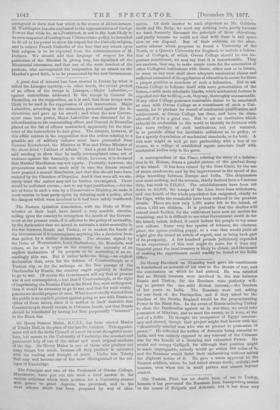A correspondent of the Times, relating the story of a
defaloa tion in St. Helena, draws a painful picture of the gradual decay of the island. It bas been ruined by the Suez Canal, by the use of steam condensers, and by the improvement in the speed of the ships travelling between Europe and India. The shipmasters- now want nothing, and the revenue, chiefly derived from a Customs duty, has sunk to £18,615. The establishments have been out down to £5,620, the troops of the Line have been withdrawn, and one-fourth of the whole population has emigrated, chiefly to the Cape, while the remainder have been reduced to the greatest straits. There are now only 2,681 males left in the island, of whom 1,154 are children. It is probable that the decline will• extend much further, for the cultivators have now no motive for remaining, and it is difficult to 'see what Government could do for the island, unless, indeed, it could induce the people to try some• new culture. Some very fine species of tobacco, the cinchona plant, the opium-yielding poppy, or a rose that would yield oil might give the island an article of export, and so bring back part of its prosperity, A few hundred pounds judiciously expended on an experiment of this sort might do more for it than any Imperial grant the local treasury is likely to obtain, and the means of making the experiments could readily be found at the India. Office.






































 Previous page
Previous page